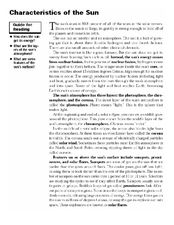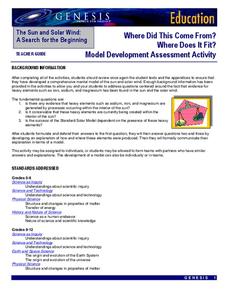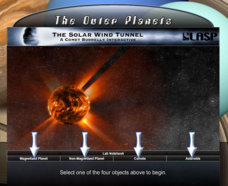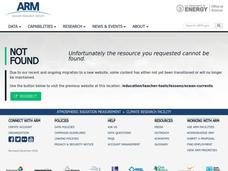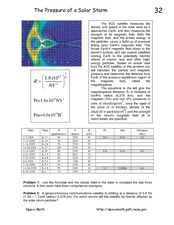Rice University
Characteristics of the Sun
After reading about how the sun gets its energy, and about the layers and features of the sun's atmosphere, heliologists complete a comprehension worksheet. On it, they label features on a diagram of the sun and match terms from the...
NASA
Comet on a Stick
Since you can't go to the comet, bring the comet to you. Young scientists build models of comets using everyday materials and then participate in a simulation of the interaction between the comet and other bodies in the solar system....
Howard Hughes Medical Institute
Distribution of Elements in Earth’s Crust
How do scientists know the difference between a meteorite from space and a regular rock from the earth? Scholars read a passage and answer comprehension questions about the creation of the solar system. They extrapolate the main ideas to...
NASA
A Different Perspective
What can we learn from the data? Young scholars analyze actual solar data to answer specific questions. The activity presents an opportunity for an open-ended investigation of the data to conclude a five-part series on solar winds.
NASA
Revising an Investigation
Write, edit, and then revise! The fourth lesson in a five-part series asks peers to provide feedback on research. Individuals then use the research to edit and revise conclusions and develop their presentations.
NASA
Exploring Data
Bring the sun to your class! Young scholars analyze actual solar wind data in the second lesson of a five-part series. Their analysis includes speed, temperature, and density data.
NASA
Model Development Assessment Activity
Time to show off what they've learned! The final lesson in the series of six asks young scholars to process their learning from the previous lessons. They identify possible elements of the sun as well as a possible origin.
NASA
Developing an Investigation
Watch as your class makes the transition from pupils to researchers! A well-designed lesson has scholars pick a solar wind characteristic to research. They then collect and analyze official data from the LANL website. This is the third...
NASA
Catch a Piece of the Sun
What does the sun mean to you? Learners have many different interests that may have connections to the sun. Whether its solar radiation, solar flares, or solar storms, there are connections to daily interests that may surprise your...
NASA
MASS, MASS – Who Has the MASS? Analyzing Tiny Samples
What is it worth to you? A hands-on instructional activity asks groups to collect weights of different combinations of coins and calculate weighted averages. They use the analysis to understand the concept of an isotope to finish the...
Laboratory for Atmospheric and Space Physics
The Solar Wind Tunnel
The winds of change are blowing in our very own solar system! But what makes some heavenly bodies more affected by solar winds than others? Pupils discover the concept of magnetic forces at work in space in this attractive interactive,...
PHET
The Earth as a Magnet
Everyone loves playing with magnets and iron filings. Here, young scientists first observe and then participate in an activity demonstrating magnetic fields. After completing their observations, they apply this knowledge to...
PHET
Mapping the Field of Multiple Dipole Magnets
So you built a magnetometer, now what? High school scientists use their magnetometer made in a previous lesson to map the union of magnetic fields of dipole magnets. They experiment with different alignments and draw conclusions about...
Climate Research Facility
Ocean Currents
Young scientists investigate the effects of heating a beaker of ice water by dropping dye into the water and observing how the color circulates.
Mr. E. Science
Our Solar System
The presentation starts with the scientists who made discoveries about our solar system: Ptolemy, Copernicus, Galileo, Brahe, Kepler, and Newton. It also covers the planets, inner, outer, and Pluto, satellites, and an in-depth discussion...
Curated OER
X-Ray
A striking PowerPoint that presents the Yohkoh Telescope, some information about its construction, and the amazing x-ray images of the sun that have been captured. Specific information about the electromagnetic phenomena is given. This...
Curated OER
Magnetopause and Solar Storms
In this magnetopause worksheet, students use a given equation to find the distance from the Earth where the solar wind pressure and the Earth's magnetic field pressure are equal. Students are given 5 different solar storms and use the...
Curated OER
The Sun
For this sun worksheet, students are given a diagram of 8 structures of the sun and they label each structure with a given term. They also fill in 8 blanks to complete sentences about the sun, its characteristics and the layers of its...
Curated OER
FRAMES OF REFERENCE: THE BASICS
Students examine the concept of frames of reference in physics: that two frames of reference, each moving with respect to the other with a constant velocity v, observe the same accelerations and therefore Newton's laws are the same in both.
Curated OER
The Pressure of a Solar Storm
In this solar storm activity, high schoolers are given three equations and they calculate the magnetic pressure and the particle pressure of a solar storm. They also determine the distance to the magnetopause of the solar storm and...
Curated OER
The Sun
In this sun worksheet, students label the interior and outer features of the sun plus compare the sun to other stars. This worksheet has 7 fill in the blank and 6 short answer questions.
Curated OER
Parametric Functions and Substitutions
In this solar winds activity, students determine the strength of magnetic storms in terms of the size of the change they make in the Earth's magnetic field. This worksheet has 3 problems to solve.
Curated OER
Blast's Cosmic Carnival
Students, after analyzing the history of a concentrator, model how a Genesis spacecraft concentrator works by playing a game. In groups of three or four, after being given materials to work with, are challenged to roll the rubber balls...
Exploratorium
Exploratorium: Space Weather Research Explorer
Explore weather phenomena that occur in space. Topics covered include coronal holes, coronal mass ejections, solar flares, solar wind, the magnetosphere, auroras, and how space weather affects us on Earth.


